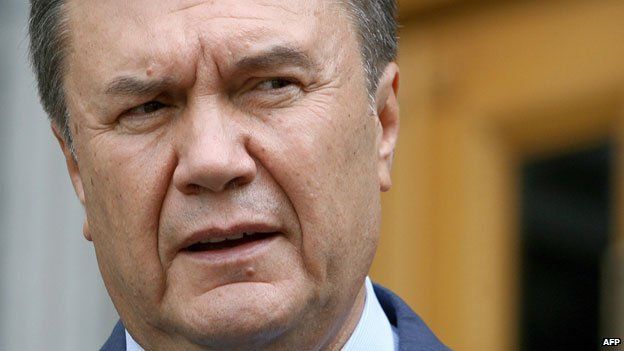The day I enraged Viktor Yanukovych
- Published

"Are you saying I am frightened? Do I look frightened - do I look frightened to you?"
Viktor Yanukovych, the president of Ukraine as he was then, did not look frightened exactly, but he did look very annoyed. A translator whispered his words in my ear. He stared me straight in the eye as he spoke and the sense of menace was palpable.
I was interviewing him in a huge gilded room high in the colonnaded presidential palace in the centre of a wintry Kiev. This was three years ago, well before Ukraine was convulsed by violent protest, back when Yanukovych was still very much in charge.
I'll happily admit I was becoming a little bit frightened by the turn the interview was taking. It is always unsettling to upset a head of state - especially when they look and sound like a character from a Scorsese movie. And - as it turned out - I was right to be anxious because Yanukovych was to exact a bizarre revenge.
I had asked the president a series of pretty tough questions about corruption in the country. I had even related the concerns I had heard from ordinary Ukrainians that corruption goes - as they put it - "right to the top of his administration". But this didn't seem to bother him. He said his administration had made tackling corruption a key priority and that he was confident he would get the problem under control.
It was when I asked why the Maidan - the main square in Kiev - had been fenced off and was being guarded by policemen that his face clouded and his jaw clenched.
The Maidan was a powerfully symbolic place in Ukraine well before the deadly drama of the past few months. Indeed, it had already played a decisive role in Yanukovych's career.
The Maidan was the scene of the so-called Orange Revolution. That's when, back in the winter of 2004, tens of thousands of Ukrainians came out into the freezing square to protest against what they claimed was a rigged election and demand the president stand down.
Yanukovych was that president - and he was forced to resign. But he staged a spectacular comeback, and won the presidency in 2010.
He was still a controversial figure when I met him the following January. Observers said the election had been fair but many Ukrainians told me they believed that under Yanukovych their country was becoming progressively less democratic and less free.
This was when the Arab Spring was in full bloom. Images of protesters in city squares in Egypt and Tunisia were leading the news across the world every night. Against that backdrop, the fence that had mysteriously appeared around the Maidan seemed a symbol of the loss of freedom.
One of Ukraine's most successful authors, Andrei Kurkov, had told me the fence should be torn down. "We must be careful to protect the freedoms we have won," he'd said. Other Ukrainians were even more outspoken. "That fence is a fence against democracy," Petro Poroshenko, one of the country's richest businessmen, told me.
Yanukovych eventually recovered his composure.
He told me that the surface of the square had been damaged and that the fence was there while it was being repaired. A few minutes later he signalled our interview was over. He shook hands politely but it was clear he was still annoyed by my impertinence.
We returned to Britain and our feature was broadcast. I assumed my role in the story of Yanukovych's fence was over. But a week or so later I got a text from my aunt.
"Would you like a tie for an Easter present?" the text read.
I had no idea what she was talking about.
"Take a look at the Sunday Times!" came her reply. She ended it with a worrying exclamation mark.
I rushed out to buy a copy. "Fashion experts urge BBC scruffs to smarten up," ran the page-three headline, above a photograph of me.
The caption told me everything I needed to know. "BBC reporter shocked the president of Ukraine with his dress sense."
There was no mention of my questions about the fence around the Maidan. According to the article he was "aghast" at my decision to conduct the interview in - and I quote - "blue jeans and a grey suit jacket over a blue shirt with a white T-shirt showing at the open neckline".
Presumably - and I am guessing now - someone close to Yanukovych had tipped the papers off about my sartorial faux pas.
I actually thought I looked rather smart but the "fashion experts" the Sunday Times had spoken to disagreed. Menswear designer of the year Patrick Grant urged "rude" presenters to "dress to impress, and wear a collar and tie when meeting dignitaries".
The article prompted a small flurry of comment pieces in other national newspapers discussing the poor standards of dress set by me and a couple of other BBC correspondents.
It was a small thing - and I thought it was rather funny - but it does tell you something important about Yanukovych. He and his backers are resourceful, imaginative and determined.
I was not surprised when he turned up in a press conference Russia on Friday, dapper in his sharp suit and tightly knotted blue tie, claiming that the new government is illegitimate and that he would fight "for the future of Ukraine against those using fear and terror".
Yanukovych may be down but he is not yet out.
Follow @BBCNewsMagazine on Twitter and on Facebook